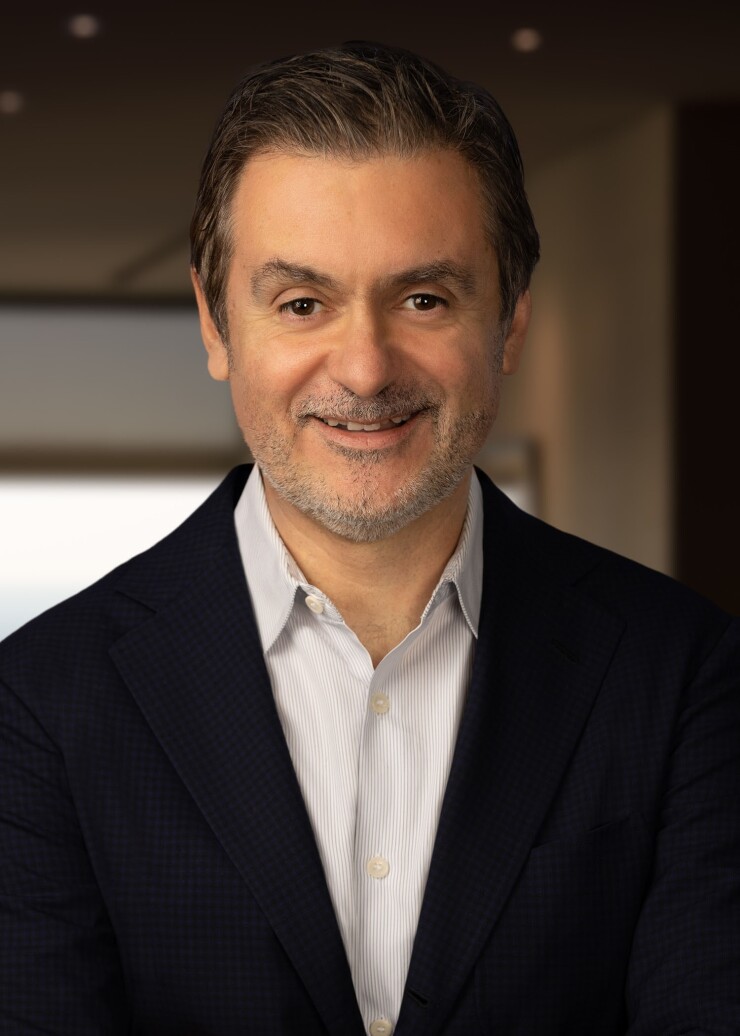Goldman Sachs is using artificial intelligence to turn software developers and others into "superhumans," according to Chief Information Officer Marco Argenti, who spoke at the Fintech Nexus conference last week. The bank is experimenting with AI in three areas in particular: making software developers more productive, extracting knowledge out of documents and robotic process automation.
AI experimentation is a popular trend among banks these days.
"I would not say that [Goldman is] alone," said Dan Latimore, chief research officer at Celent.
Among other banks that are using AI, Morgan Stanley is using a licensed version of ChatGPT to analyze research reports such that financial advisors can ask specific questions like, "What does Morgan Stanley think about the oil and gas sector?" he noted.
"It really depends on the personality of a CIO in that department, but also what the executives are seeing as well," Latimore said.
"Lots of financial and investment institutions are using AI for fraud analysis, data processing, wealth management and internal operations," said Darrell West, senior fellow, governance studies at the Brookings Institution's Center for Technology Innovation. "Finance is one of the easiest areas to automate because a lot of what they do involves financial transactions. Machines are less emotional and more rational than humans so are ideal for managing money. Algorithms have grown quite adept at analyzing text and financial data."

Bank CEOs are dealing with two opposing forces, Argenti said. On one hand there is increasing regulatory pressure to put the right safeguards in place. On the other there's the opportunity of AI to achieve a rapid pace of innovation.
"How you balance the two and how you do it safely, how you actually get that line between innovation, safety, compliance is actually one of the biggest challenges that every CEO, CIO and board thinks about today," he said.
AI can be a sustaining technology that makes a business more productive or it can be a disruptive technology that will make a business more competitive, he said.
"Productivity is great, but it's not enough," Argenti said. "You can get fit as a human body, but that doesn't necessarily make you a champion. You can be very efficient. You can still not win in the market."
AI for developers
A key use case for AI at Goldman Sachs is suggesting code that developers can review and fine-tune.
"You can easily see at least a 10% to 30% boost of productivity," Argenti said. "So a superhuman developer could be 30% to 40% more productive. If you map it to the typical IT cost of an organization, especially in our field, that very quickly can add up to $100 million in savings."
This level of productivity boost is "a reasonable hypothesis right now," Latimore said. "I absolutely agree with his belief that this is a way to get supercharged."
Goldman has been doing a proof of concept with a handful of developers for several months, Argenti said in an interview.
"Depending on the outcome, we will decide how we want to expand it to more people," Argenti said. "This concept of being a co-pilot and not a pilot is interesting because it doesn't really create code that goes into production for you. You always have the hands on the wheel. You will go through the same steps to validate, to certify and to make sure it's safe and so forth. But it's an incredible productivity boost."
Using such technology could also attract talented developers, who "almost demand" it, he said.
Other banks, including Wells Fargo, also use AI to suggest next lines of code, similar to the way email apps offer to finish users' sentences.
Latimore also emphasized that no bank can let AI generate code without human oversight.
"It's a way to get a first draft out there and gain productivity, but you've still got to edit it and turn it into your own, make it something above average that you'd be proud of, but you can get some help on getting started," Latimore said.
Other uses of AI at Goldman
Another area where Goldman is looking to deploy AI is what Argenti calls "knowledge digitization." An example is document classification.
"Every one of us receives hundreds of thousands, if not millions of documents, which are in the form, for example, of contracts," he said. "And then you need to do what's called entity extraction" to make key data points readable by a machine.
"It turns out that AI is extremely good at that," Argenti said.
In an earnings call, there is a lot of information to be extracted. AI can automatically summarize the call.
"We're experimenting with that," Argenti said. "And it turns out that the capability of actually extracting the right information for the specific reader is extraordinary. Imagine how that could scale. You could actually have your customers interact and ask questions about it and have automatic answers."
Goldman Sachs is also looking at using robotics process automation, another form of AI, to automate front to back processes, reporting, settlements and other processes.
"One of the emerging characteristics of large models is that they're really good at figuring out step A after step B and actually being very creative at creating workflows," Argenti said. "That is a huge area of impacting a lot of companies like ours."
Argenti believes in letting people experiment with new technologies and in making bold decisions.
"You need to have some form of intuition to say, OK, I cannot do everything, but I will choose this and maybe something else, and then you really focus on those," he said. "That kind of intuition also comes from experimentation. I think this is a moment where every company and every CEO and every CIO needs to go through that mental model."





